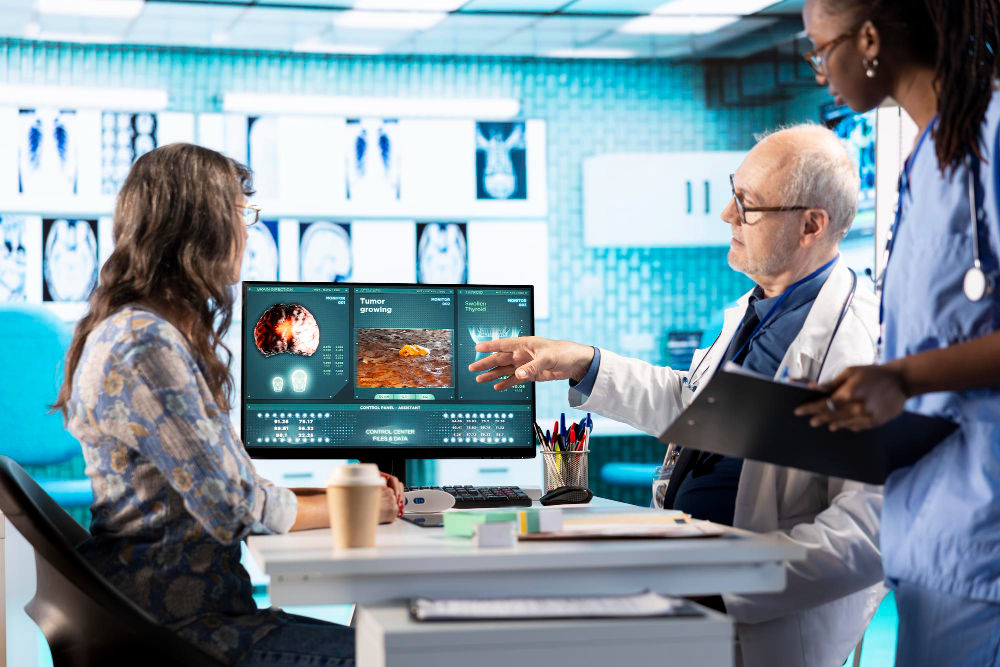IT in Healthcare: AI, Telemedicine & Digital Records
Date : 4 Sept2025
Walk into any hospital today, and you will notice how technology has seeped into almost every step of care. From the moment patient details are recorded till the time they are discharged, the presence of IT in healthcare has transformed the industry into a connected and intelligent ecosystem. In first-world countries, IT has also become the backbone of modern medicine.
The changing face of healthcare with IT
The role of IT has grown beyond administrative support. Hospitals rely on it to smooth processes, reduce delays, and improve coordination among doctors, nurses, and support staff. A well-designed IT framework makes sure that medical professionals spend less time hunting for information and more time caring for patients.
Healthcare is also a data-driven field. Every patient generates a story made of symptoms, lab results, prescriptions, and treatments. The role of IT in patient data management is to organize these stories into a single accessible source. Because when accurate information is available at the right time, the decision is taken quickly and happens to be safer.
This is where the technology stands apart. A digital twin is not a one-time simulation as it constantly updates and recalibrates, meaning the digital model is as alive as the machine it mirrors. For businesses navigating Industry 4.0, this continuous loop of information builds a foundation for smarter decisions, faster problem-solving, and reduced costs.
AI in Medicine
Artificial intelligence in healthcare is more about predictive power. Algorithms today can analyze thousands of scans in minutes, flagging early signs of diseases that might escape the human eye. For oncologists, AI-driven imaging tools are helping identify tumors at their earliest stages. For cardiologists, predictive analytics assists in spotting patients at risk of heart conditions before they reach a critical stage. Virtual nursing assistants are available 24/7, guiding patients through medication schedules and answering common health queries. Administrative tasks like claim processing and appointment scheduling are now managed more efficiently with AI-powered chatbots. This frees up valuable time for doctors and staff, ensuring human expertise is spent on patient care.
Telemedicine: Closing the geographical gaps
If there was one area that proved the worth of IT in healthcare during the pandemic, it was telemedicine. Video consultations became lifelines for patients unable to step out of their homes. Even now, telemedicine continues to bridge the gap between patients and specialists.
Imagine a patient from a remote village consulting a neurologist from a metropolitan hospital without ever leaving home. Telemedicine has removed geographical boundaries, brought healthcare closer to underserved communities, and built a new level of trust in virtual care.
For healthcare providers, it is also an efficient way to manage time and resources. Follow-ups that do not require physical presence can be handled through secure platforms, reducing overcrowding in hospitals. Patients, on the other hand, save time, travel costs, and receive quicker medication.
Digital Health Records: the smartcare foundation
Among the many contributions of IT, digital health records stand out as a revolution. Hospitals that once managed walls of paper files now have electronic health records that can be accessed with a few clicks.
Digital health records make information accessible, portable, and accurate. A doctor in one department can instantly review a patient’s entire medical history without waiting for files to be transferred. Emergency care becomes faster because critical details like allergies, past surgeries, and ongoing medications are readily available
On a larger scale, digital records contribute to research. Anonymized patient data helps identify disease patterns, track the effectiveness of treatments, and support public health planning. For patients, it brings ownership of their own health information, empowering them to be active participants in their care journey.
Security and Trust
With great data comes great responsibility. As hospitals digitize information, data privacy and security become crucial. Patients trust healthcare providers with their most sensitive details, and IT systems must ensure this trust is never broken. Encrypted platforms, regular audits, and compliance with global data protection standards form the shield that guards digital health ecosystems.
The journey of IT in healthcare is only at its midpoint. AI is advancing towards personalized treatment plans where therapies are customized based on a patient’s genetics. Telemedicine platforms are integrating with wearable devices to monitor health round-the-clock. Digital health records are being linked across hospitals and countries, creating a global network of healthcare knowledge.
Imagine a patient from a remote village consulting a neurologist from a metropolitan hospital without ever leaving home. Telemedicine Healthcare thrives on precision, empathy, and trust. IT in healthcare strengthens each of these pillars by giving doctors better tools, patients greater access, and hospitals smoother operations. Artificial Intelligence sharpens diagnosis, telemedicine extends care across distances, and digital health records make information flow seamlessly. Together, they form the foundation of a healthcare system that is fast, reliable, and patient-centered.


